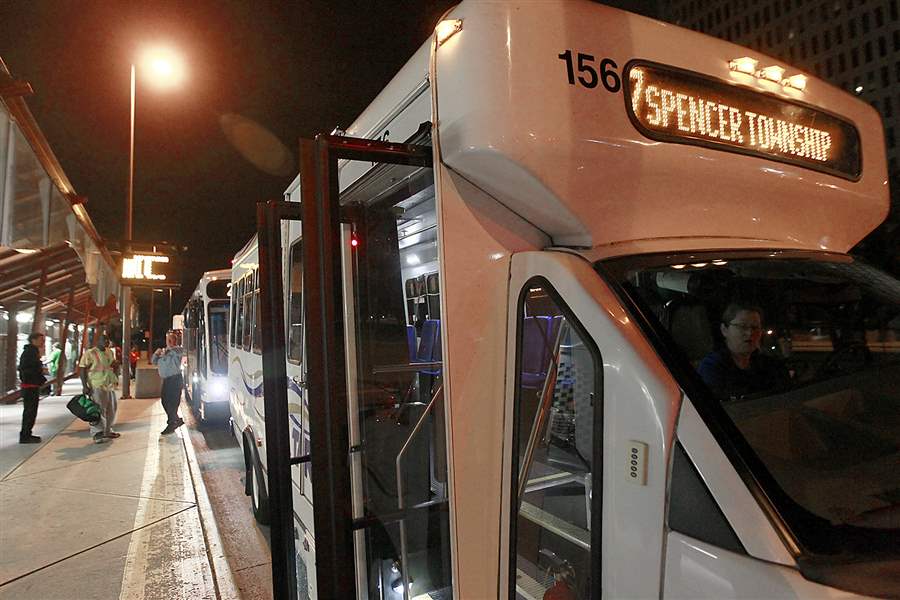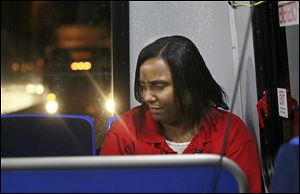
Commentary
Transit lifeline in peril
Spencer Twp. vote reflects local disconnect on vital issue
9/22/2013
A Spencer Township-bound TARTA bus awaits riders in downtown Toledo. Township voters will decide in November whether to withdraw from TARTA. A charter member, Spencer Township has been part of TARTA for 42 years.
THE BLADE/AMY E. VOIGT
Buy This Image

A Spencer Township-bound TARTA bus awaits riders in downtown Toledo. Township voters will decide in November whether to withdraw from TARTA. A charter member, Spencer Township has been part of TARTA for 42 years.

Mondia Brown depends on TARTA’s No. 7 bus to take her from downtown Toledo to her job at a Meijer store along the route to Spencer Township.
In predawn darkness last week, Mondia Brown boarded TARTA bus No. 7 in downtown Toledo, the express bus to Spencer Township, on her way to work. A cashier at Meijer, she works 25 hours a week for $12.70 an hour.

Jeff Gerritt.
At 6 a.m., Ms. Brown had already been up for two hours. She had ridden the No. 27 bus from her home in South Toledo to TARTA’s Government Station at Jackson and Erie streets — a 35-minute trek. Her ride from downtown to her job takes another 21 minutes.
Without it, Ms. Brown, 37, said she would have to quit her job, unless her employer transferred her. But if Spencer Township votes in November to leave the Toledo Area Regional Transit Authority, the No. 7 route that takes Ms. Brown to work will stop within 90 days, TARTA Marketing Director Steve Atkinson said.
Ms. Brown represents one of the nearly 14 percent of Toledo households — disproportionately poor and African-American — that don’t have vehicles. Metropolitan Toledo is ranked among the worst U.S. metro areas for having jobs in neighborhoods served by public transit. In suburban Toledo, only one-third of the jobs are accessible to transit users.
Yet in a city that clamors about jobs and economic development and is continuing a community conversation on race, no one is talking about mass transit. Toledo’s shot-callers have remained all but silent on it, even though few issues have more influence on social and racial equity and the ability of northwest Ohio to expand a 21st-century economy that’s not governed by municipal borders.
Candidates for Toledo City Council and mayor, including incumbent Mayor Mike Bell, apparently don’t understand that it’s their constituents, hopping on buses to employers in suburban malls and industrial parks, who stand to lose when communities such as Perrysburg, Rossford, and Spencer Township try to leave TARTA.
What’s more, the Toledo Metropolitan Area Council of Governments (TMACOG), the region’s metropolitan planning organization, has been so lacking in leadership on transit that it failed to take a position on campaigns this year in Rossford and Spencer Township to leave TARTA.
Funded by a 2.5-mill property tax, TARTA serves eight local communities and provides more than 3.4 million rides a year. It offers regional connections that no local shuttle service can.
“Citizens for Choice” tried to put the question of TARTA membership on Rossford’s Nov. 5 ballot, even after an independent consultant concluded that the community gets TARTA service at below cost. A missed deadline will keep the question off the Rossford ballot.
But TARTA will appear on the November ballot in Spencer Township, which also gets a bargain. With fewer than 2,000 residents, Spencer Township receives $161,000 worth of transit services annually for $88,000 in taxes. Federal and state grants pick up the rest. For chump change, TARTA provides call-a-ride and paratransit service and express buses that connect riders to downtown Toledo.
TARTA reported more than 13,500 boardings in Spencer Township last year. A charter member, Spencer Township has been part of TARTA for 42 years.
Ms. Brown has taken the express bus to Spencer Township for 13 years. On weekends, when TARTA reduces service, Ms. Brown must take three buses to get to work, a trip that takes more than three hours.
A single mother of three, Ms. Brown wasn’t complaining. She likes her job and the people she works with. And for $10 a week, she can buy a TARTA pass that takes her to and from work and wherever else she needs to go. On rare occasions when she has to take a cab to work, the fare is $25 each way.
“I can’t afford that,’’ she said, as the bus rolled west on I-475. “This is my transportation.”
When people are willing to ride a bus for two or three hours to get to jobs that pay $12 an hour or a lot less, it’s wrong to take away their opportunity to work.
If TARTA’s Spencer Township service ends, employees at an industrial park, patients at the Western Lucas County Clinic, and people who use the Spencer Township Neighborhood Center would also lose their ride. The center includes a day-care center, senior nutrition program, and Women, Infants, and Children (WIC) office. TARTA’s Spencer Township buses also serve nearby Lucas Metropolitan Housing Authority apartments.

A Route 7 rider examines a schedule. If TARTA’s Spencer Township service ends, employees at an industrial park, patients at the Western Lucas County Clinic, and people who use a neighborhood center would be among those losing their ride.
Spencer Township should be watching a groundbreaking case in the Dayton area. The Federal Highway Administration’s Office of Civil Rights recently ruled that Beavercreek effectively discriminated against minority residents by not allowing certain regional bus stops to extend a route. If the city doesn’t fix the problem, it risks losing millions in federal highway dollars.
But progressive, self-interested communities shouldn’t need a federal hammer to do the right thing. Urban regions around the country — areas that Toledo competes with for talent and capital — are expanding transit to slow sprawl, reduce road congestion, improve air quality, and jump-start millions of dollars in transit-oriented development. Transit also attracts the educated young people who drive the new knowledge-based economy.
It’s not just for big regions like Denver, which enacted a regional sales tax in 2004 to build 140 miles of rail and rapid bus lines. Grand Rapids, Mich., a city smaller than Toledo, is counting on a forthcoming $40 million rapid transit bus line to reduce commute times, raise property values, and create jobs and development.
To build the 9.6-mile Silver Line, the Grand Rapids area enacted a six-city property tax increase in 2011, which leveraged $32 million in federal grants and $8 million in state matching dollars. Peter Varga, chief executive officer of The Rapid, the local transit agency, believes the new rapid bus line will give Grand Rapids a 5-to-1 return on investment in retail stores, housing, and other development.
In Toledo, the mass transit debate should not be about whether the regional system can hold onto Spencer Township. It should be about how TARTA can expand into other communities such as Oregon, Springfield Township, and Monclova Township; how TARTA can move from a fragmented local property tax to a more uniform and sustainable regional sales tax; how the region can create a better, more reliable basic bus system; and whether certain high-density corridors can support rapid transit buses, or even light rail.
That conversation won’t happen here if the major players don’t speak up.
TMACOG’s 20-year plan includes expanding public transit and increasing local, state, and federal funding to do so. Five years ago, at the request of some mayors, the agency met with local stakeholders and officials and tried, unsuccessfully, to forge a consensus on transit.
“It was a difficult issue,” TMACOG’s Diane Reamer-Evans told me.
I understand the challenges of getting central cities and their suburbs to agree on anything. It takes getting them to understand that they will rise, or fall, together. The most successful urban areas already know it.
TMACOG and others will have to decide whether they’re willing to lead. Where is the champion for transit and progress in northwest Ohio and the advocates for people like Mondia Brown? In the coming weeks, I hope Toledo can find some answers.
Jeff Gerritt is deputy editorial page editor of The Blade.
Contact him at: jgerritt@theblade.com, 419-724-6467, or follow him on Twitter @jeffgerritt.